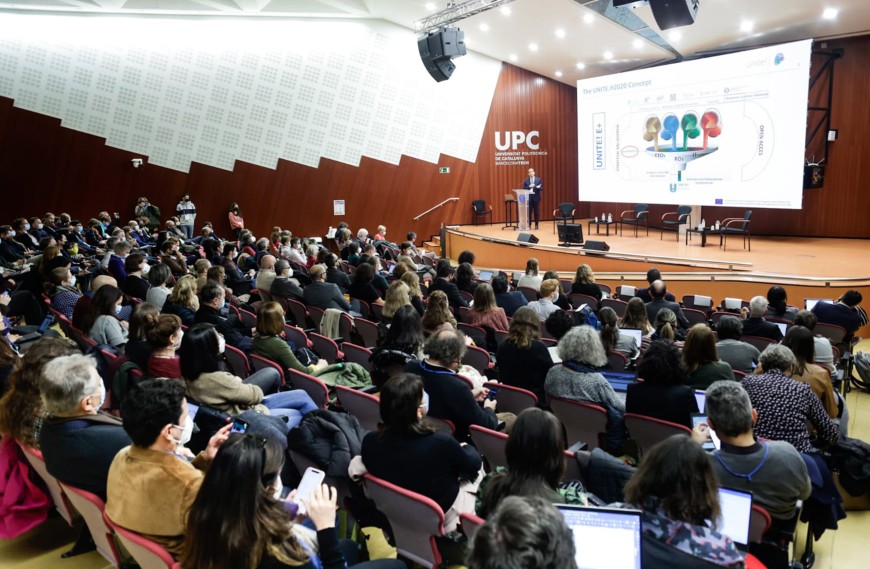First insights
4th Unite! Dialogue Barcelona
2021/12/02
From November 29, the Universitat Politècnica de Catalunya (UPC) welcomed the international delegations of the partner universities of its university alliance Unite! to the 4th Unite! Dialogue and the first branding event in Barcelona.

1st Day of the Dialogue
In the morning the Steering Committee, including all the executive teams from each university, had a co-creation meeting with the Students in Unite! for Representation and Empowerment (SURE!) to define and better adapt the bottom-up structure approach for Unite!'s organisation.
The afternoon theme focused on innovation, it's incentinves and it's challenges. With the first Innovation Community matchmaking event, Unite! gathered different external speakers from institutions with different levels of engagement (local, regional and global). The matchmaking event was divided in three paralel session according to the different themes: Innovation and Regional Involvement; Entrepeneurship Education and Innovation Ecosystems. After each session, all participants (virtual and physical attendees) were able to ask questions and debate with the speakers.
Ethics and technology was another key topic from yesterday's afternoon which inaugurated the first session of Unite!'s Branding Event. This session was very much focused on the positive and negative impacts of Artificial Inteligence (AI) in society and our everyday life. The session finished with a debate guided by students, with key questions aimed at making the public reflect about the risks, accountability, transparency of AI and how conscious we are about it. All in all, the students finished the debate with a request for more formation on this topic at university, specifically for the future technologists.
Finally, Unite!'s president Tanja Brühl, UPC's rector Daniel Crespo and UPC's KLO for Unite! Juan Jesús Perez, revealed the winning team of Unite!4Future and handed out the official diploma to one of the team members Fernando Amador, which is a UPC student. Unite!4Future will enable student participation by presenting concrete, original and implementable ideas that bring added value for all Unite! community. The winner team proposal was a a smartphone application – the Akamu App – which allows students to duel their fellow students about lecture topics. This gamified solution will enable us to establish a more sustainable way of learning by quickly motivating the students to play duels frequently.
During the whole day, Task Forces and Work Packages were able to have internal meeting to work on their projects and outcomes in a physical meeting for first time after more than a year.
2nd day of the Dialogue
The second day was all about learning and co-creating together with the Unite! community. We also had the first session of which will be the governing council of the alliance, the Academic Forum. We beginned with the first meeting of Unite!'s Academic Forum. The governing council of the alliance that brings together staff, academics and students from each university has discussed in this first session the new features of the future mission of Unite!
The president of Unite! Tanja Brühl and the rector of the UPC, Daniel Crespo, met with more than 200 participants at the Opening Session which brought together staff and students from the seven universities that are part of Unite!
Unite! president and TU president Professor Tanja Brüh: "We started as pioneers committed to transforming European higher education and our mission statement illustrates that we are committed to innovation, multidisciplinarity, teaching, research and entrepreneurship"
Afterwards, Unite! president welcomed Stefan Östtlund to the stage, so that the Vice President for Global Relations at KTH Royal Institute of Technology in Stockholm, could agree to take over the organisation of the 5th edition of Unite! from 8-10 March.
Yesterday's sessions were aimed at sharing and co-creating with the Unite! community, to construct the pathways for the development of Unite!'s Metacampus, a digital platform that connects the seven universities in the alliance, to enable online-mobilty access to the range of programmes and diversity of activities offered through Unite! The following session also allowed virtual and physical attendees to participate in a co-creation session with the aim of collaboratively defining the principles that will inspire the future actions of the alliance. The outcomes of the session will help to define the topics for Unite!'s new mission, which we will present in the submission of the new Erasmus Plus call that was just launched yesterday morning by the European Comission, in line with the priorities of the European Education Area by 2025.
Finally, all the working groups (Work Packages and Task Forces) presented their work in a walk-in poster session, design to inform the community about the various current initiatives and projects.
On December 1, an event was held for the first time targeting key external stakeholders of Allianz. Called the Branding Event, this conference aimed to promote the visibility of the Alliance and increase its engagement with the various stakeholders. The speakers' debate with the Unite! community on the five key areas of ethics and technology, impact on the European Higher Education Area, impact on regional innovation ecosystems, leadership in smart technologies and global impact on society was streamed live.
Unite!/mho
About Unite!
Alongside TU Darmstadt as the coordinator,Unite! (University Network for Innovation, Technology and Engineering) also includes Aalto University (Finland), KTH Royal Institute of Technology (Sweden), Grenoble Institute of Technology (France), Politecnico di Torino (Italy), Universitat Politècnica de Catalunya (Spain) and Universidade de Lisboa (Portugal).
The seven partner universities aim to use the European University to create a trans-European campus for students and researchers with the involvement of regions and companies. The partners have a total of 167,000 students, already cooperate closely in more than 80 EU projects and have exchanged more than 2,000 students in the past five years. The alliance has set itself the goal of combining courses for the benefit of students, breaking down existing technical and administrative hurdles, and thus significantly increasing student mobility. Research will also benefit from the conditions created for larger and easier cooperation, which will strengthen the competitiveness of the European Higher Education Area overall.
